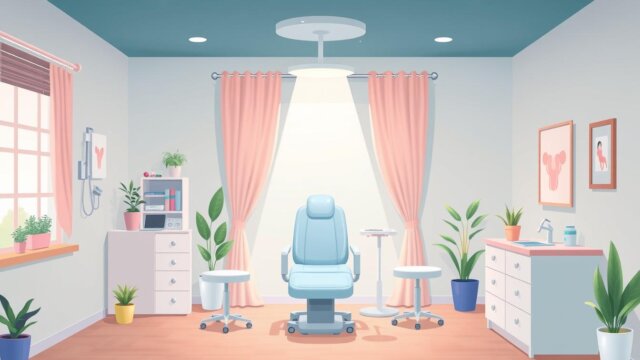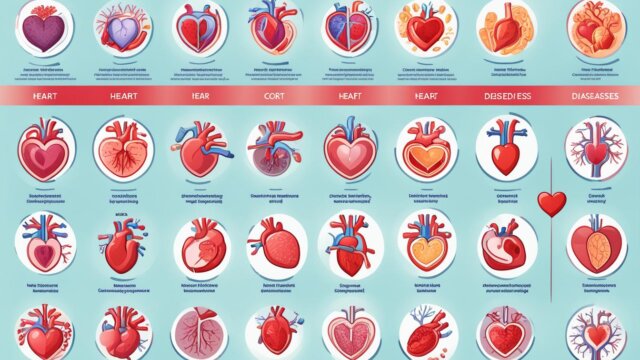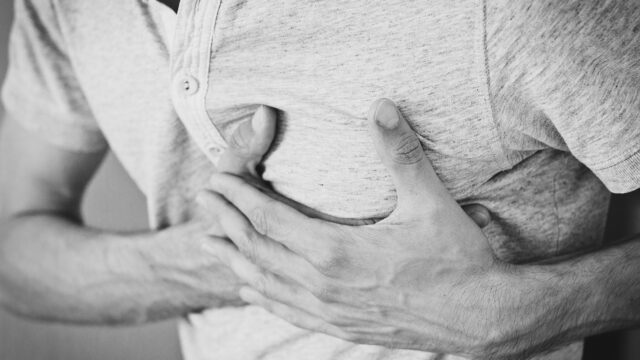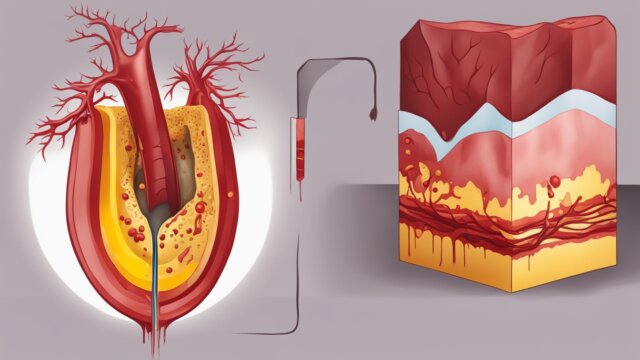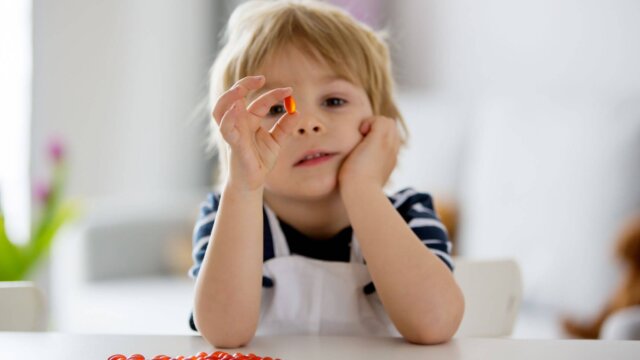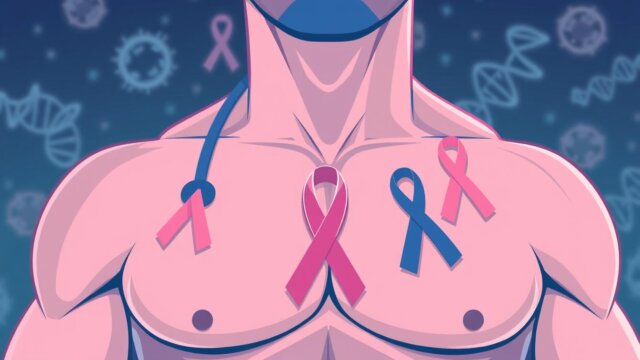FTC disclaimer: This post may contains affiliate links and we will be compensated if you click on a link and make a purchase.
Dehydration is a serious health issue that affects many Americans yearly. It has severe effects if not treated. In fact, it’s very risky for young kids and older people. Young kids often get dehydrated from bad diarrhea and vomiting. Older folks are at risk because they have less body water and some health issues or medicines. Even being in the heat or exercising a lot can make anyone dehydrated.
It’s key to know about dehydration’s causes, signs, and effects for right treatment and prevention. This guide will cover everything about this common but serious condition. It will give you the info to keep yourself hydrated and healthy.
Key Takeaways
- Dehydration is a serious condition that can lead to life-threatening complications
- It is especially dangerous for young children and older adults
- Common causes include severe diarrhea, vomiting, fever, and excessive sweating
- Symptoms range from dry mouth and fatigue to confusion and dark urine
- Proper hydration and prompt medical attention are crucial for treatment
What is Dehydration?
Overview of Dehydration
Dehydration happens when your body loses more fluid than it takes in. This leads to an imbalance of water and electrolytes. The human body is made up of 55% to 65% water. Two-thirds is inside cells and one-third is outside, with a fifth being in blood vessels.
This balance is key for keeping fluids right, blood volume steady, and organs working well.
Common Causes of Fluid Loss
Severe diarrhea, vomiting, fever, and sweating a lot from the heat or hard exercise are common reasons for losing fluids and electrolytes. Even small illnesses like lung or bladder infections can make dehydration worse, especially for older people. Some medicines and health issues can also make you lose more fluids or sweat more, making dehydration worse.
If you don’t drink enough water, dehydration can turn into a serious health problem that needs quick treatment.
Older adults are more likely to get dehydrated, with 17% to 28% in the U.S. facing it. This is because they might not move much, have trouble feeling thirsty, have diabetes, kidney disease, or fall down. Babies and young kids are also at risk, especially with diarrhea or throwing up.
“Dehydration is a serious condition that can have severe consequences if left untreated. It’s important to recognize the signs and symptoms and take action to replace lost fluids and electrolytes.”
Keeping fluids in balance is key for good health. By knowing why dehydration happens and staying hydrated, you can avoid this dangerous condition.
Symptoms of Dehydration
Dehydration shows up differently in kids and adults. Early signs include feeling thirsty, dizzy, having a dry mouth, feeling tired, seeing dark urine, and not peeing much. Babies, kids, older people, and those with chronic illnesses get dehydrated easily.
Signs in Infants and Children
In babies and young kids, dehydration signs are a sunken spot on the head, not crying much, not peeing enough, and being very sleepy. Kids can lose 3-5% of their weight and still be okay, but losing 6-10% is serious, and over 10% is very serious. Babies and young kids get dehydrated fast from diarrhea, vomiting, and high fever.
Signs in Adults
Adults may feel very thirsty, not pee much, have dark pee, feel tired, dizzy, and confused. Older adults often don’t feel thirsty, making them more likely to get dehydrated. Dehydration can cause serious problems like heat stroke, seizures, kidney failure, coma, and death if not treated.
Not feeling thirsty doesn’t mean you’re not dehydrated. Drinking more fluids is key when you’re sick or in the heat.
“Severe dehydration is a medical emergency and requires immediate medical attention, as it can lead to serious complications like fits, brain damage, and death if not treated promptly.”
Symptom | Infants and Children | Adults |
|---|---|---|
Thirst | May not be evident | Extreme thirst |
Urination | Decreased or no wet diapers | Infrequent urination, dark-colored urine |
Physical signs | Sunken soft spot, few/no tears, drowsiness | Fatigue, dizziness, confusion |
Dehydration can be very dangerous if ignored, especially in babies, kids, and older adults. Keeping an eye on how much fluid you drink and getting help when needed can stop severe dehydration and its bad effects.
When to Seek Medical Attention
Dehydration can be mild or severe. It’s important to know when you need a doctor. If you or someone close to you has had severe diarrhea for over a day, feels irritable or confused, can’t keep fluids down, or has a bloody stool, call a doctor. These signs mean you need urgent medical help.
Severe dehydration is a serious emergency. Older people and those with certain diseases like diabetes are more at risk. Mild dehydration can make you thirsty, give you a dry mouth, make your urine dark, cause headaches, and lead to muscle cramps.
If these signs get worse, like having dark urine, dry skin, confusion, a fast heartbeat, and sunken eyes, get help right away.
Tests for dehydration might include blood tests to check the kidneys, urine tests to find the cause, and blood sugar tests if diabetes is suspected. If not treated, severe dehydration can be deadly, cause permanent brain damage, or lead to seizures. Call for emergency help if you lose consciousness, your alertness changes, you have a fever over 102°F, show signs of heatstroke, or get worse even with treatment.
Symptom | Mild to Moderate Dehydration | Severe Dehydration |
|---|---|---|
Thirst | Yes | Extreme |
Dry Mouth | Yes | Severe |
Urine Color | Darker | Dark yellow or amber |
Headache | Yes | Severe |
Muscle Cramps | Yes | Possible |
Dry Skin | No | Yes |
Confusion | No | Yes |
Rapid Heartbeat | No | Yes |
Sunken Eyes | No | Yes |
To avoid dehydration, drink lots of fluids every day, especially when it’s hot or you’re active. For serious dehydration or heat emergencies, you might need to go to the hospital for fluids through an IV.
If you or someone close to you shows signs of severe dehydration, get medical help right away. Don’t wait, as not treating it can be very dangerous.
Causes of Dehydration
Dehydration happens for many reasons, from not drinking enough fluids when sick or busy, to complex medical issues and environmental factors. Knowing why dehydration happens helps us spot the signs and get the right treatment.
Illness and Medical Conditions
Some illnesses and medical issues cause you to lose too much fluid and get dehydrated. Things like diarrhea, vomiting, and fever can make you lose fluids fast. Also, having diabetes without control can make you pee more and lose water. Some medications, like diuretics, can also mess with your fluid balance.
Environmental Factors
Being in certain environments can also make you dehydrated. Being in hot, humid weather or at high altitudes makes you sweat more and lose water. Doing a lot of physical activity in these places can make dehydration worse.
Cause | Description |
|---|---|
Illness and Medical Conditions |
|
Environmental Factors |
|
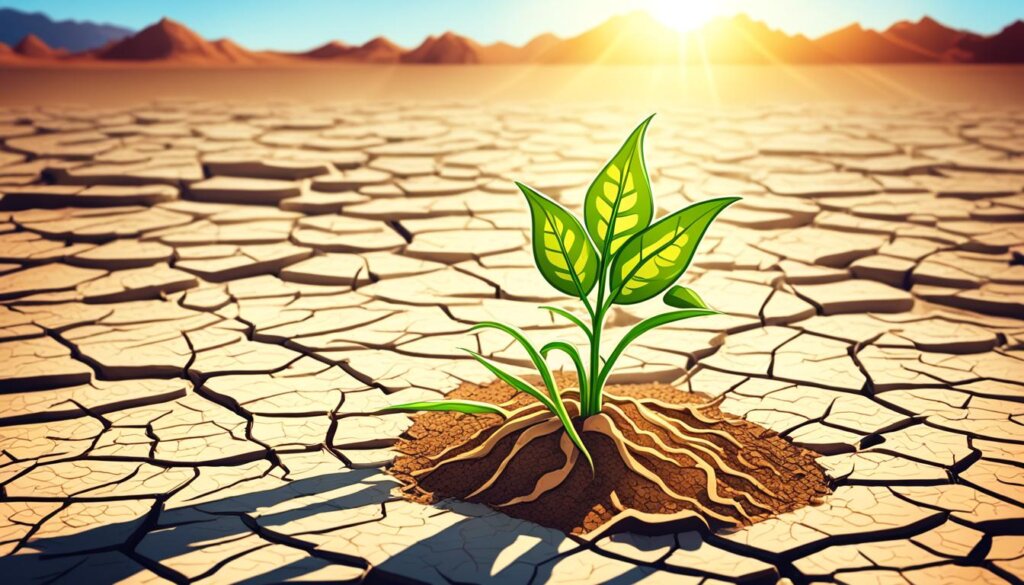
“Dehydration can occur for simple reasons like not drinking enough fluids when you’re sick or busy, but it can also be caused by medical conditions and environmental factors.”
Knowing the reasons for dehydration is key. It helps us prevent and manage it, whether it’s from an illness, a medical issue, or the environment. By understanding these causes, we can take steps to stay hydrated and keep our health in check.
Risk Factors for Dehydration
Some groups face a higher risk of dehydration. Infants and young kids are at risk from severe diarrhea and vomiting. These can cause them to lose fluids fast.
Older adults have less fluid in their bodies. They may not feel thirsty as much and have trouble moving around. This makes it hard for them to drink enough water.
People with chronic illnesses, like diabetes, are also at risk. They might lose more fluid or have trouble controlling it.
Being in hot, humid places is another risk factor. Workers, athletes, and those who love the outdoors are at higher risk. They lose a lot of water through sweat. It’s important for them to drink enough water to stay healthy and perform well.
Risk Factor | Explanation |
|---|---|
Infants and Children | Vulnerable to severe diarrhea and vomiting, leading to rapid fluid loss. |
Older Adults | Reduced fluid reserves, less acute thirst response, and mobility issues make it challenging to stay hydrated. |
Chronic Illness | Conditions like diabetes can increase fluid loss or impair fluid regulation. |
Outdoor Work/Exercise | Excessive sweating and water loss in hot, humid environments can lead to dehydration. |
Knowing these risk factors helps people prevent and manage dehydration. This keeps them healthy and well.
Complications of Dehydration
Dehydration is a serious issue that can cause health problems if ignored. It can lead to heat-related illnesses like heat cramps, heat exhaustion, and dangerous heatstroke. These illnesses happen when the body is too hot, often from being active in the heat for a long time.
Dehydration can harm the body’s systems, causing problems with organs. For instance, it can lead to urinary tract infections, kidney stones, and even kidney failure. It can also mess up the body’s electrical signals, causing seizures. If dehydration gets really bad, it can make blood pressure drop too low, which is very dangerous.
- Heat-related illnesses like heat cramps, heat exhaustion, and heatstroke can occur due to dehydration and exposure to high temperatures.
- Dehydration can lead to urinary tract infections, kidney stones, and even kidney failure.
- Electrolyte imbalances from dehydration can cause seizures.
- Severe dehydration can result in a dangerous drop in blood pressure, known as hypovolemic shock.
It’s important to know the signs of dehydration and get help if it gets bad. Quick action can stop these serious problems and keep you healthy.
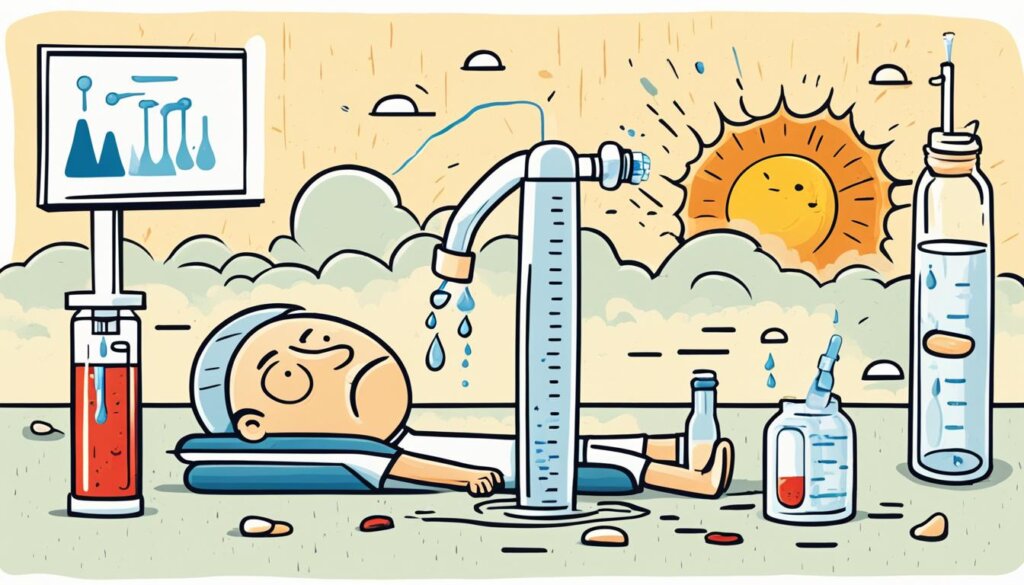
“Dehydration can lead to severe complications if left untreated, including organ dysfunction and life-threatening conditions. It’s crucial to stay hydrated and seek medical attention if dehydration persists or worsens.”
Preventing Dehydration
Drinking enough water is key to avoiding dehydration, especially when you’re active or it’s hot. Your body loses about 64 ounces of water each day through breathing, sweating, and going to the bathroom. Being in extreme heat, high humidity, or doing hard workouts can make you lose more water, so drinking water is even more crucial.
Staying Hydrated During Exercise
People who exercise a lot or do sports need to watch their water intake closely. Athletes can lose up to 10% of their body weight through sweat during sports. Football players and those who run long distances can lose about 1.5 and 1.28 liters of sweat per hour, respectively.
To stay hydrated, it’s best to drink at least 16 fluid ounces of water or an electrolyte drink for every pound you lose while exercising.
Hydration for Older Adults
Older people are more likely to get dehydrated because they hold less water and don’t handle heat and humidity well. As we get older, we don’t feel as thirsty, which can lead to dehydration. Older folks should really keep an eye on how much fluid they drink, especially if they have health issues or take medicines that can cause dehydration.
“Staying hydrated is critical for your health, no matter your age or activity level. Pay attention to the signs of dehydration and make sure to drink plenty of fluids throughout the day.”
Drinking enough water is vital for your health. By keeping an eye on your water intake, replacing electrolytes, and watching for risks, you can stop dehydration from happening.
Hydrating Beverages and Foods
Drinking enough water is key for good health. Water is the top choice for staying hydrated. But, drinks like sports drinks can also help. These drinks have electrolytes like sodium and potassium to refill what’s lost when you sweat a lot.
Caffeine and alcohol can dry you out and should be used in small amounts. But, some fruit juices and drinks might have too much sugar and not enough electrolytes. Water-rich foods like soups, fruits, and vegetables are great for staying hydrated.
Hydrating Food | Water Content | Water Quantity (per serving) |
|---|---|---|
Cucumbers | 95% | 10 oz |
Zucchini | 95% | 4.2 oz |
Celery | 95% | 3.9 oz |
Tomatoes | 94% | 4 oz |
Cabbage | 92% | 2.2 oz |
These foods are full of water and give you important nutrients, antioxidants, and health benefits. Adding these water-rich fruits and vegetables to your meals can keep you hydrated and support your health.
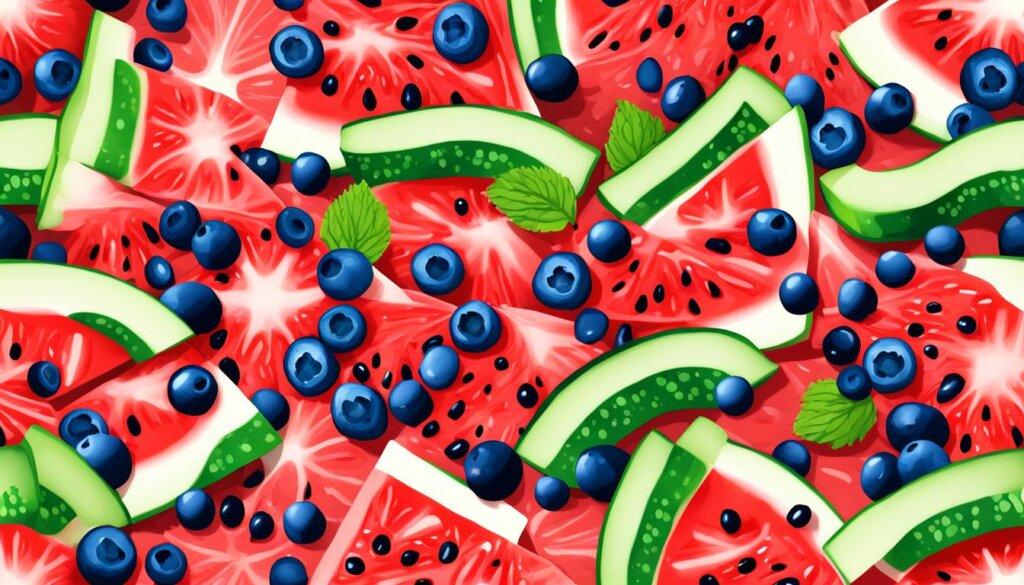
“Staying hydrated is key for good physical and mental health. Choosing the right drinks and eating hydrating foods helps your body get the fluids it needs to do well.”
Hydrating Dairy and Plant-Based Options
Milk and yogurt are good for hydration, too. Milk has potassium and calcium, which are important for health. Milk was found to be more hydrating than water in a study with adult men. Plant-based options like tofu and coconut water also help with hydration and give you important nutrients.
Being careful with what you drink and eating hydrating foods can keep you hydrated all day.
Tips for Increasing Fluid Intake
Drinking enough water is key for your health. Here are some easy ways to drink more water:
- Carry a reusable water bottle with you all day. Refill it often. This keeps you reminded to drink water.
- Add lemon, lime, or fruit to your water for taste. This makes drinking water fun.
- Drink water before meals to meet your daily needs. The U.S. National Academies suggest 15.5 cups for men and 11.5 cups for women.
- Use phone or computer reminders to drink water at set times. This helps you stay on track.
- Start a “drink more water” challenge with friends. This can make you drink more.
Eating foods high in water, like fruits and veggies, also helps. If you’re not often thirsty and your urine is clear, you’re likely drinking enough. But, drinking too much water can be harmful, especially for athletes.
If you’re pregnant or breastfeeding, you might need more water. These tips can help you stay hydrated and support your health.
Recommended Daily Fluid Intake | Amount |
|---|---|
Men | 15.5 cups (3.7 liters) |
Women | 11.5 cups (2.7 liters) |
Staying hydrated is vital for good health. By following these tips, you can make sure your body gets the fluids it needs.
Dehydration During Pregnancy
Dehydration is more common during pregnancy than at other times. It can lead to serious health problems for both the mother and the baby. Hyperemesis gravidarum, which causes intense vomiting during pregnancy, occurs in 3 percent of pregnancies. Women need to drink more water during pregnancy because of the extra demands it puts on their bodies.
Dehydration can affect the pregnancy in big ways. Severe dehydration can change how the baby moves. It can also cause serious issues like neural tube defects, low amniotic fluid, premature labor, poor breast milk production, and birth defects.
Mild dehydration is usually not a big deal during pregnancy. But severe dehydration can be risky for both the mother and the baby. It can lead to less amniotic fluid, which affects the baby’s growth and health. It can also cause preterm labor and affect breast milk production. Dehydration can also lead to nutrient deficiencies, which are bad for the pregnant woman and the baby.
Dehydration can make the pregnant woman overheat, which is a sign of dehydration. Mild dehydration can cause dry mouth, sleepiness, thirst, less need to pee, headaches, constipation, and dizziness. Severe dehydration can cause extreme thirst, dry skin and mouth, irritability, and confusion.
To treat dehydration, doctors might give fluids through an IV or add electrolytes like sodium and magnesium. Women with hyperemesis gravidarum or other conditions should talk to their doctor about when to go to the hospital for dehydration.
Prenatal care is key in preventing dehydration, especially if it comes from other health issues. It’s important to take dehydration seriously during pregnancy to protect the baby.
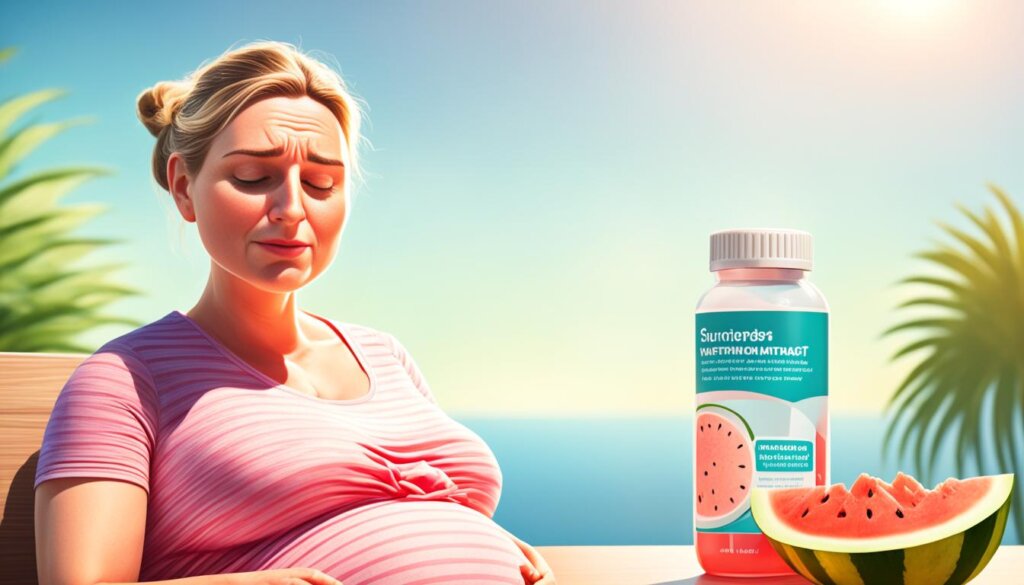
“Dehydration during pregnancy can have serious consequences for both the mother and the developing baby. It’s crucial for pregnant women to stay hydrated and seek medical attention if they experience symptoms of dehydration.”
Treating Mild Dehydration
Mild dehydration can be treated at home by drinking more fluids. You can drink water, electrolyte-containing sports drinks, or oral rehydration solutions. These drinks help replace lost fluids and electrolytes. Watching your urine color and how much you urinate can tell you if you’re hydrated.
People who are active should drink 16 to 20 ounces of fluids before going outside. While outside, drink six to 12 ounces of fluid every 10 to 15 minutes. After being active, drink at least 16 to 24 ounces to refill your fluids.
How much water you need daily depends on your weight, age, how active you are, and the weather. Doctors say not to drink alcohol or caffeine to stay hydrated. Fruit juices and drinks might have too many carbs and not enough sodium, which can upset your stomach.
Carrying a water bottle and keeping it full can encourage you to drink more. Choosing water over sugary drinks, adding lemon, and eating foods with lots of water can help you drink more water.
Signs of mild dehydration are thirst, dry mouth, feeling dizzy, headaches, dark urine, and not urinating much. Severe dehydration shows extreme thirst, very dry mouth, fast breathing and heart rate, low blood pressure, fever, little to no urine, feeling irritable, sleepy, and confused.
Dehydration can happen from hard exercise in the heat, being sick with vomiting or diarrhea, having a fever, drinking too much alcohol, some medicines, diabetes problems, and not drinking enough water. Adults should drink about 2 to 2.5 liters of fluid daily, and kids need 1 to 2 liters. Babies and young kids are more likely to get dehydrated, especially when they’re sick.
Severe dehydration needs quick medical help with fluids through an IV. For mild dehydration, drink more water, oral rehydration solutions, and skip alcohol and caffeine.
The elderly are more at risk of dehydration because of poor kidneys, chronic illness, not moving much, and some medicines like diuretics. They should drink regularly to avoid getting confused, constipated, dizzy, and weak.
Seeking Medical Care for Moderate to Severe Dehydration
If you have moderate to severe dehydration, you need to see a doctor right away. Doctors might give you IV fluids to fix the fluid and electrolyte imbalance. You might need to stay in the hospital if you feel dizzy, have a fast heartbeat, are confused, or your blood pressure is low.
Severe dehydration can cause serious problems, like brain damage or even death. People like kids, older adults, and pregnant women are more at risk. If they have severe dehydration, they might show signs like:
- Children: No tears when crying, being very tired, dry diapers, and feeling cold and clammy.
- Pregnant Women: Feeling very thirsty, sunken eyes, a fast heart rate, low blood pressure, a dry mouth, and dry skin.
Getting medical help fast is key for severe dehydration. Doctors often use IV fluids for quick recovery. They will watch your blood pressure and heart rate closely. To rehydrate, you should drink water, sports drinks, soup, milk, and fruit juices. But, avoid drinks like sugary soda, alcohol, and caffeinated drinks.
Getting help quickly is very important for severe dehydration. With the right treatment, you can get better and avoid serious health issues.
Conclusion
Keeping your body hydrated is key to good health. Fluid balance is vital, and dehydration happens when you lose more fluids than you drink. Knowing how to prevent and treat dehydration keeps your body working right.
Many things can cause dehydration, like sickness, hot weather, or certain health issues. Mild dehydration can be fixed at home, but serious cases need quick doctor help to avoid big problems.
By drinking enough water, your body’s systems run smoothly. This helps avoid issues like thinking problems, mood swings, and organ trouble. Drinking water and checking your fluid levels daily helps keep your body healthy and happy.
FAQ
What is dehydration?
Dehydration happens when your body loses more fluid than it takes in. This leads to an imbalance of water and electrolytes. It can be caused by severe diarrhea, vomiting, fever, or too much sweating.
What are the common causes of dehydration?
Dehydration often comes from severe diarrhea, vomiting, fever, or sweating a lot. Even small illnesses like lung or bladder infections can cause dehydration, especially in older people.
What are the symptoms of dehydration?
Dehydration signs vary by age. Babies and young kids might have a dry mouth, no tears when crying, or not pee often. They could also have sunken eyes and a soft spot on the head, and feel tired. Adults might feel very thirsty, not pee much, have dark urine, feel tired, dizzy, or confused.
When should I seek medical attention for dehydration?
Call a doctor if you or someone has diarrhea for over 24 hours, feels irritable or confused, can’t keep fluids down, or has a bloody or black stool. These signs mean you need urgent medical help.
What are the common causes of dehydration?
Dehydration can happen for simple reasons like not drinking enough when sick or busy. It can also be caused by serious illnesses like severe diarrhea, vomiting, fever, or uncontrolled diabetes. Some medicines, hot weather, high altitude, or hard exercise can also lead to dehydration.
Who is at higher risk for dehydration?
Some people are more likely to get dehydrated. This includes babies, young kids, older adults, and those with ongoing illnesses like diabetes. Babies and kids can get hit hard by diarrhea and vomiting. Older adults might not feel thirsty as much and have trouble moving around. People who work or exercise outside in the heat are also at higher risk.
What are the potential complications of dehydration?
Not treating dehydration can lead to serious problems. These include heat-related illnesses like heat cramps, heat exhaustion, and even deadly heatstroke. It can also cause urinary tract infections, kidney stones, or kidney failure. Electrolyte imbalances can lead to seizures. Severe dehydration can cause a dangerous drop in blood pressure, known as hypovolemic shock.
How can I prevent dehydration?
To avoid dehydration, drink lots of fluids and eat foods with a lot of water like fruits and veggies. If you’re exercising hard or in the heat, start hydrating the day before and keep drinking during and after. Older adults need to watch their fluid intake closely, especially if they have ongoing health issues or take medicines that make them pee more.
What are the best beverages for staying hydrated?
Water is best for staying hydrated. Sports drinks with electrolytes like sodium and potassium can help during long exercise. But limit drinks with caffeine or alcohol because they can make you lose more water. Fruit juices and some drinks might have too much sugar and not enough electrolytes.
How can I increase my fluid intake?
Carry a water bottle with you and refill it often. Add a slice of lemon or lime to make the water taste better. Drink water before meals and set reminders to drink more. Try a “drink more water” challenge with friends or family. Eating more fruits and veggies can also help you drink more water.
How does dehydration affect pregnancy?
Dehydration during pregnancy can be dangerous for both mom and baby. It can cause low amniotic fluid, increase the risk of early labor, lower breast milk, and even neural tube defects in the baby. Pregnant women should drink plenty of water, especially when they’re losing fluids like during morning sickness or in the heat.
How can I treat mild dehydration at home?
Mild dehydration can be treated at home by drinking more fluids. Use water, sports drinks with electrolytes, or over-the-counter solutions to replace lost fluids and electrolytes. Watch your urine color and how often you pee to check if you’re getting enough fluids.
When do I need medical treatment for dehydration?
If you’re moderately to severely dehydrated, you need medical help right away. Doctors may give you fluids through an IV to fix the balance. You might need to stay in the hospital if you have symptoms like dizziness, fast heartbeat, confusion, or low blood pressure. These could be signs of a serious condition.

